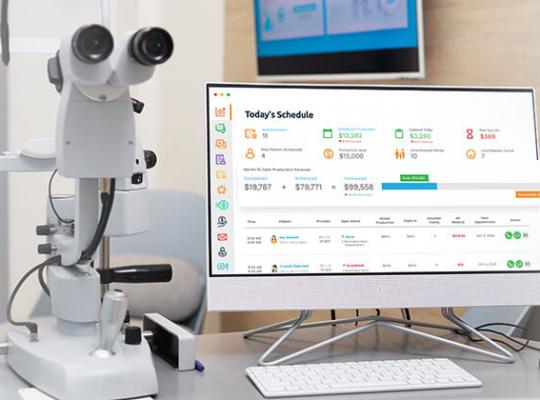Oral Outlook: Navigating the Q1 Dental Industry Landscape

As 2024 unfolds, the dental industry finds itself at the intersection of innovation and evolving patient needs. Q1 sets the tone for the year, and this holds true for the dental field. From emerging technologies to shifting patient demographics, dentistry is experiencing a wave of developments that demand attention.
Whether you're a dental professional keen on staying ahead of the curve or an industry enthusiast curious about the latest breakthroughs, we've got you covered. Join us in exploring the current dental industry landscape.
Emerging Trends in Dental Technology

The first quarter of the year has witnessed an impressive surge in dental technology, promising to redefine the way oral healthcare is delivered. The dental technology market is projected to grow by an annual growth rate of 8.55% (CAGR 2024-2028) showcasing a robust growth trajectory. Some of the dental treatment and device trends fueling this forecast include:
AI-Integrated Diagnostics
The integration of Artificial Intelligence (AI) in diagnostics continues to evolve, enabling more accurate and efficient assessments. In Q1, dental practices are exploring AI-powered diagnostic tools that enhance precision and aid in early detection. The focus is on leveraging machine learning algorithms to analyze imaging data, leading to improved diagnostic capabilities and more effective treatment planning.
Advancements in 3D Printing
The field of 3D printing is witnessing significant advancements, particularly in dental laboratories. Dental professionals are increasingly adopting 3D printing technology to create precise and customized dental prosthetics. This not only streamlines the production process but also allows for a higher level of customization, meeting the unique needs of each patient.
Mainstream Adoption of CBCT
Cone-beam computed tomography (CBCT) has become mainstream in dental practices, offering detailed three-dimensional views for enhanced diagnostics and treatment planning. The continued integration of CBCT technology in Q1 provides practitioners with a more comprehensive understanding of dental anatomy, leading to more precise surgical interventions and improved patient outcomes.
Growing Investment in Digital Impressions
Another Q1 dental tech trend is the expanding use of digital impressions, moving away from traditional impression materials. Dental practices are investing in intraoral scanners and digital impression systems, enhancing the accuracy of impressions and improving the overall patient experience. This shift towards digital impressions is expected to contribute to greater efficiency and precision in restorative procedures.
Dental Telehealth

The increasing adoption of teledentistry platforms is transforming how dental consultations are conducted. In Q1, dental professionals should continue integrating virtual platforms into their service features to provide initial assessments and follow-up appointments. This trend will boost patient acquisition and retention strategies in several ways:
Switching from Mango and Sesame to Adit saved Peace Garden Dental 22 hours/ week What could your dental team do with an extra 20+ hours a week? After juggling multiple platforms, Peace Garden Dental switched from Sesame and Mango to Adit. In...
Download Case StudyExpanded Virtual Consultations
Virtual consultations in Q1 are extending beyond initial assessments to cover a broader range of dental services. Practices are increasingly relying on telemed technology for follow-up appointments, treatment planning discussions, and even post-operative care. This expansion of virtual services contributes to a more flexible and patient-friendly approach to oral healthcare.
Interactive Patient Education
Expect a surge in the use of telehealth for patient education. Employing virtual spaces to interactively educate patients about oral health, treatment options, and preventive care. This approach not only enhances patient understanding but also promotes a collaborative approach to treatment decision-making.
Integration with Electronic Health Records (EHR)

To streamline processes and ensure comprehensive patient care, dental offices are integrating telehealth services with electronic health records. This allows for seamless sharing of patient information, improved coordination among oral healthcare providers, and takes a more holistic approach to telehealth within the broader healthcare ecosystem.
Remote Monitoring Solutions
Beyond consultations, Q1 may create an increased interest in remote monitoring solutions. Dental practices are exploring technologies that enable remote monitoring of certain oral health parameters, providing a proactive approach to patient care. This includes monitoring orthodontic progress, post-surgical healing, and the effectiveness of at-home oral care routines with devices like smart toothbrushes.
Adherence to Regulatory Guidelines
With the growing use of telehealth, there is a heightened focus on adherence to regulatory guidelines like HIPAA. Early in 2024, dental practices should continue investing in secure and compliant teledentistry platforms, ensuring the ethical and secure delivery of their virtual healthcare services. This commitment to regulatory compliance aims to provide patients with a safe and trustworthy telehealth experience.
Regulatory Updates and Compliance

The dental industry operates within a dynamic regulatory environment, and staying ahead of the latest updates is challenging for many clinics. In Q1, regulatory changes have focused on infection control measures, sedation protocols, patient data security, and emerging technologies.
For example, in 2021, Congress passed the Corporate Transparency Act to fight money laundering through businesses. Certain businesses like dental offices now need to share ownership details with the U.S. Treasury's Financial Crimes Enforcement Unit. Starting from January 1, the Financial Crimes Enforcement Network is accepting these reports. Existing dental practices and qualifying companies have one year to submit before penalties apply.
Infection Control Protocols
Q1 brings a renewed emphasis on infection control measures in dental practices. The Centers for Disease Control and Prevention has updated its guidelines to focus on strengthening protocols to minimize the risk of infectious diseases. This includes stringent sterilization procedures, updated guidelines for personal protective equipment (PPE), and comprehensive staff training to ensure a safe environment for both patients and healthcare professionals.
Digital Security in Teledentistry
With the increased adoption of teledentistry, the U.S. Department of Commerce has released a final report addressing how to properly secure digital health platforms according to HIPAA requirements. Q1 will see dental administration updates to ensure the ethical and secure use of telehealth technologies. Practices will continue investing in secure communication platforms like Adit that provide required encryption measures to protect patient data during virtual consultations.
Ethical Use of Patient Data
As digital technologies play a larger role in dental practice, there is a heightened focus on the ethical use of patient data. This initial quarter, regulatory updates emphasize the importance of transparent data practices, informed consent, and secure storage of patient information. Dental practices are proactively adopting data protection measures to uphold patient privacy and trust.
Sustainable Practices in Dentistry

Sustainability has emerged as a significant concern across industries, and the dental field is actively embracing eco-friendly practices. In Deloitte's 2021 report titled "Shifting Sands: Are Consumers Still Embracing Sustainability," it was found that 61% of individuals reported reducing their usage of single-use plastics. What does this mean for Q1 in 2024? Dental practices will continue to increase the use of green technologies to reduce single-use plastics and implement energy-efficient solutions.
Below are some of the more notable eco-friendly trends dental offices should consider this quarter:
Eco-Friendly Dental Materials
Dental offices are placing a greater emphasis on the use of eco-friendly dental materials. This includes a shift towards biodegradable and recyclable materials in restorative dentistry. Practices are exploring alternatives to traditional materials, reducing the environmental impact of dental procedures.
Waste Reduction Strategies
The commitment to sustainability extends to waste reduction within dental practices. In Q1, there is a notable focus on implementing strategies to minimize single-use plastics, optimize packaging, and recycle waste materials. This eco-conscious approach aligns with the broader trend towards environmentally responsible healthcare practices.
Energy-Efficient Technologies
Dental offices are incorporating energy-efficient technologies early in 2024 to minimize their carbon footprint. This includes the use of energy-efficient lighting, heating, and cooling systems. Practices are also exploring renewable energy sources, such as solar power, to further reduce their environmental impact.
Green Certification Programs
To showcase their commitment to sustainability, dental practices should consider participating in green certification programs. These programs recognize and certify practices that adhere to environmentally friendly practices. The certification serves as a testament to a practice's dedication to reducing its ecological footprint.
Patient-Centric Approaches

As patient expectations evolve, dental practices are reimagining their approaches to enhance patient satisfaction. Q1 trends indicate a growing focus on personalized treatment plans tailored to individual patient needs. Practices with enhanced patient-centric approaches report higher levels of patient satisfaction and loyalty. Understanding and embracing these trends can contribute to a thriving practice in the evolving dental landscape.
Personalized Treatment Plans
Q1 trends indicate a significant shift towards incorporating modernized treatment planning software to create care plans that meet the specific needs of each patient. From preventive care to complex procedures, dental practices are adopting a more personalized approach. This involves considering factors such as medical history, lifestyle, and oral health goals. Advanced diagnostic tools and data analytics play a pivotal role in crafting treatment plans that are not only effective but also align with the patient's unique circumstances.
Enhanced Communication Strategies
Improved communication is at the heart of patient-centric care. You can expect dental practices to continue leveraging advanced communication strategies to foster stronger dentist-patient relationships. Patient portals, mobile apps, and interactive websites are ideal centralized communication solutions to enhance information-sharing, appointment scheduling, and post-treatment follow-ups. This ensures that patients are well-informed, engaged, and actively involved in their oral health journey.
Educational Resources and Empowerment
A key aspect of patient-centricity is empowering individuals to take an active role in their oral health. Dental offices are increasingly providing educational resources, both online and in-office, to educate patients about preventive measures, treatment options, and post-treatment care. This not only enhances the patient's understanding but also fosters a sense of responsibility towards their own oral health.
Feedback and Satisfaction Monitoring

In the pursuit of patient satisfaction, Q1 will continue an uptick in the use of feedback strategies like surveys, reviews, and post-visit evaluations. This real-time feedback allows practices to identify areas for improvement and tailor their services to meet patient expectations. Patient satisfaction metrics are becoming integral in assessing the success of patient-centric initiatives.
Holistic Wellness Integration
Beyond clinical treatments, patient-centric approaches in Q1 encompass a broader focus on holistic wellness. Dental practices are exploring the integration of complementary services such as nutritional counseling, stress management, and overall well-being assessments. This approach acknowledges the interconnectedness of oral health with overall health, aligning with the growing trend towards comprehensive healthcare.
Dental Real Estate
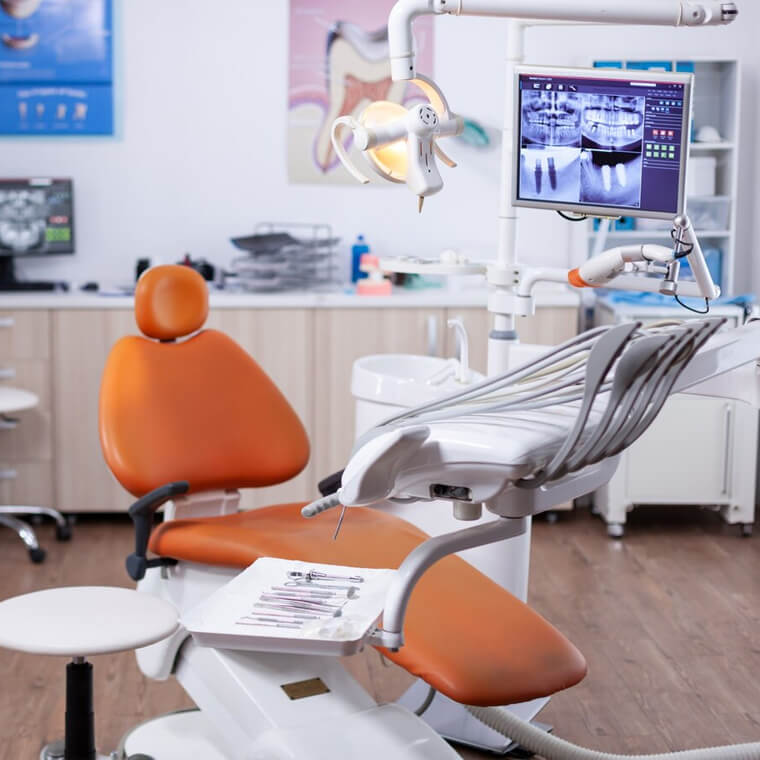
The realm of dentistry extends beyond the clinical expertise of practitioners to encompass the very spaces where oral health is nurtured and maintained. In the first quarter of 2024, the significance of dental office real estate comes to the forefront, influencing the strategic decisions and adaptive measures undertaken by dental practices.
Location Optimization
Expect to see a renewed focus on the strategic selection of dental office locations. Practices are prioritizing accessibility, visibility, and demographic considerations to optimize their location. This involves a thorough analysis of local populations, competition, and accessibility for current and potential patients. The right location contributes not only to a practice's visibility but also to its overall success and patient acquisition.
Adaptable Office Spaces
The concept of adaptable office spaces gains prominence in Q1, reflecting the evolving needs of dental practices. With the integration of teledentistry and flexible work arrangements, dental offices are exploring adaptable layouts that can accommodate both traditional in-person visits and virtual consultations. This adaptability ensures resilience in the face of changing healthcare dynamics.
Technology Integration in Office Design
The design of dental office spaces this year incorporates advanced technologies to enhance the patient experience and streamline workflows. This includes the integration of digital signage, touchless check-in systems, and state-of-the-art diagnostic tools. The goal is to create a technologically advanced and patient-friendly environment that aligns with the expectations of modern oral healthcare consumers.
Sustainability in Office Construction
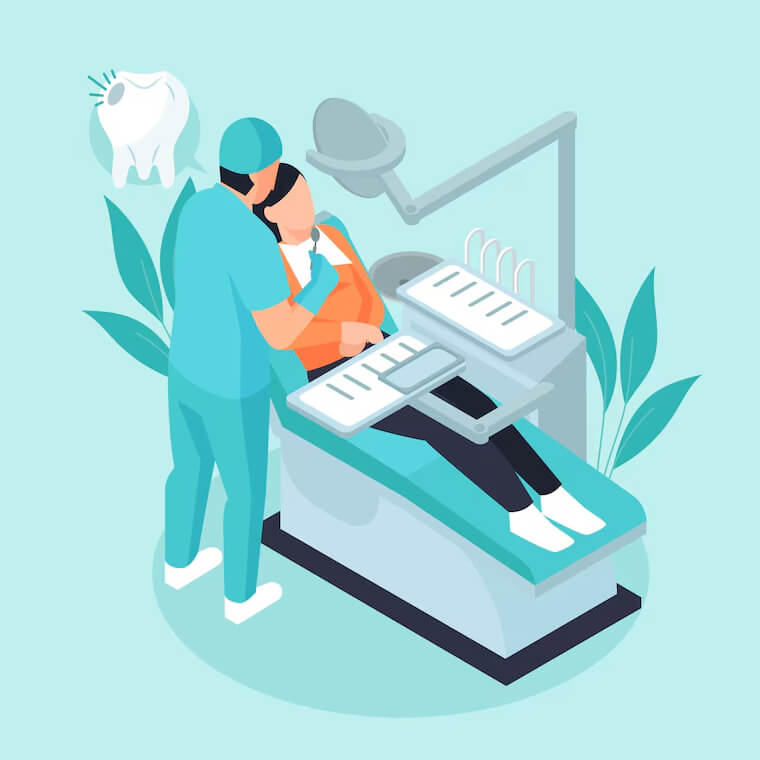
Sustainability extends beyond clinical practices into the construction and maintenance of dental office spaces. In Q1, there is a growing trend towards eco-friendly office construction, with practices incorporating energy-efficient systems, recycled materials, and green building practices. Sustainable dental office design aligns with the broader industry movement towards environmental responsibility.
Cost-Effective Space Utilization
With the changing dynamics of healthcare delivery, Q1 initiatives in dental office real estate focus on cost-effective space utilization. Practices are exploring innovative ways to optimize square footage, whether through shared workspaces, multifunctional areas, or collaborative spaces. This cost-conscious approach allows practices to maximize efficiency without compromising on the quality of patient care.
Volatile Market Conditions
Local real estate market conditions can fluctuate, and Q1 may witness a rollercoaster ride in property prices. Economic factors, demand for commercial spaces, and regional trends can influence the negotiation process. Staying informed about the specific real estate dynamics in a chosen area will empower practitioners to make informed decisions regarding the cost of acquiring a dental office.
Dental Education and Training Initiatives

In the first quarter of the year, dental education and training have taken center stage as the industry places a heightened emphasis on continuous learning and professional development. This surge in educational initiatives is responding to the rapid evolution of dental technologies and treatment modalities. Notably, educational institutions and professional organizations are pioneering innovative training programs, workshops, and online courses.
If you're considering a new offering of training and continuing education opportunities for your dental team, the following trends are gaining traction this quarter:
Online Continuing Education Courses
With the fast-paced advancements in dental technology and treatment modalities, there is a heightened emphasis on continuous learning. Expect to see a surge in dental professionals enrolling in online continuing education courses. These courses cover a range of topics, from the latest advancements in restorative dentistry to evolving practice management strategies, ensuring that practitioners stay abreast of industry developments.
Focus on Digital Dentistry
As digital dentistry becomes more prevalent, Q1 initiatives are centered around specialized training in this field. Course enrollments for digital dentistry skills, such as impression techniques, CAD/CAM technology, and computer-aided implantology are very popular. According to a study by DataHorizzon Research, digital dentistry will experience significant growth of 9.7% annually through 2032. This underscores the importance of proficiency in digital dentistry as a valuable skill set, enhancing efficiency and precision in clinical practice.
Interdisciplinary Training Programs
Recognizing the interconnected nature of healthcare, your office will notice a rise in interdisciplinary training programs early in 2024. Dental professionals are participating in collaborative training initiatives that involve cross-disciplinary learning with medical professionals. This approach aims to foster a more comprehensive understanding of overall patient health and encourages a team-based approach to healthcare delivery.
Dental Practice Management Solutions
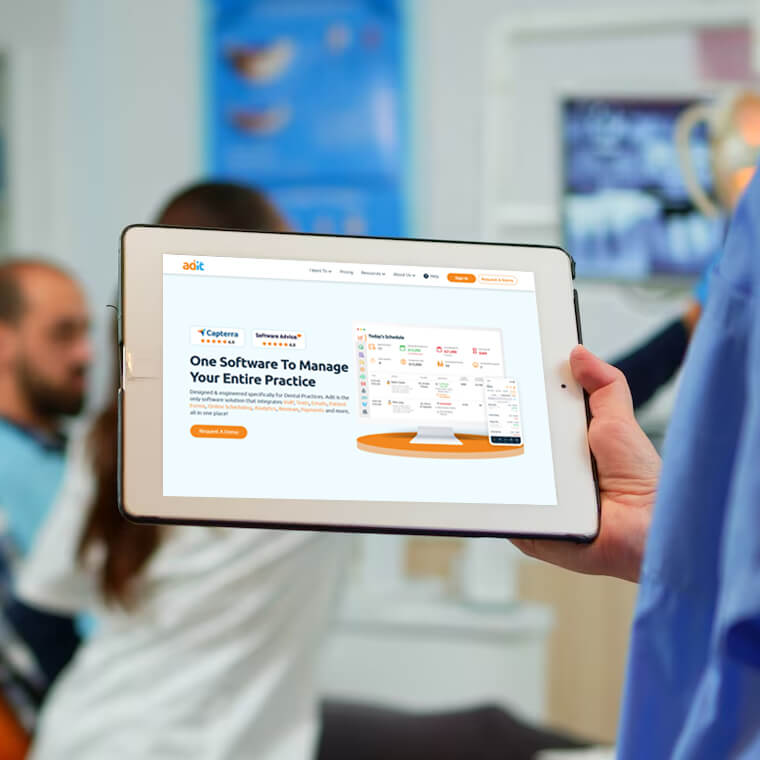
Efficient practice management is crucial for the success of dental clinics. The dental practice management software market is expected to reach $ 5.7 billion by 2031, growing at a rate of 10.1% annually, as reported by Growth Plus. This is a notable surge that shows how dental offices are increasingly relying on state-of-the-art digital management tools to streamline administrative tasks, boost patient satisfaction, smooth operational workflows, and create predictable revenue streams.
Integration of Artificial Intelligence (AI)
Q1 sees a growing integration of AI in dental practice management solutions. AI algorithms are optimizing appointment scheduling, streamlining administrative tasks, and enhancing patient communication. The predictive analytics capabilities of this technology contribute to more efficient resource allocation and improved overall practice management.
Cloud-Based Solutions for Flexibility
Dental clinics are increasingly adopting cloud-based practice management solutions, and this continues in Q1 of 2024. This shift allows for greater flexibility, enabling oral health practitioners to access patient records, appointment schedules, and administrative functions from anywhere. These online solutions contribute to improved collaboration among team members, especially in practices with multiple locations.
Enhanced Patient Engagement Platforms
Patient engagement is a key focus at the start of any new year and end-to-end dental software like Adit supports this strategy. Platforms that offer features such as automated appointment reminders, personalized treatment plans, and secure patient SMS messaging contribute to improved communication and patient satisfaction.
Data-Driven Decision Making
With the digitization of dental practices, Q1 initiatives emphasize the importance of data-driven decision-making. Modern practice management software should incorporate robust analytics tools that provide insights into key performance indicators, patient demographics, and financial metrics. Dental practices leveraging this data in 2024 have an edge over competitors when making decisions that contribute to practice growth and efficiency.
Telehealth Integration
Telehealth continues to have far-reaching impacts on dental organizations in early 2024. The integration of virtual consult features within practice management solutions is continuing to rise in demand for offices everywhere. This technology allows for a seamless connection between teledental visits and the overall practice workflow. Features such as virtual waiting rooms, secure video conferencing, and integrated telehealth billing contribute to a more cohesive and patient-centric practice environment.
Cultural and Diversity Initiatives in Dentistry

Recognizing the importance of cultural competence in oral healthcare, Q1 has seen an upswing in initiatives promoting diversity and inclusion within the dental profession. Dental associations, universities, and professional organizations are actively addressing the need for a more diverse workforce and culturally sensitive patient care.
This shift towards inclusivity is not only fostering a more representative dental community but also enhancing the ability of practitioners to provide culturally competent care.
Diversity Scholarships and Mentorship Programs
To create a more inclusive dental community, early 2024 initiatives should include an increase in diversity scholarships and mentorship programs. Dental associations and institutions are actively promoting opportunities for underrepresented minority groups in dentistry, aiming to bridge gaps and foster diversity within the profession.
Cultural Competence Training
Recognizing the importance of cultural competence in providing effective patient care, dental offices will see a rise in cultural competence training programs being offered for their teams. These initiatives can enhance the ability of oral healthcare practitioners to understand and address the diverse cultural backgrounds of their patients, ultimately contributing to improved patient-provider relationships.
Multilingual Communication Strategies

Dental practices are recognizing the importance of and adopting multilingual communication strategies in Q1 to cater to their diverse patient populations. From informative materials to patient consultations, efforts are being made to ensure effective communication regardless of language barriers. This approach contributes to a more inclusive and accessible healthcare environment.
Community Outreach Programs
Expect an increase in community outreach programs organized by dental offices and institutions. These programs focus on providing oral health education, screenings, and treatments to underserved and diverse communities. By actively engaging with different communities, dental professionals contribute to improving overall oral health equity.
Diversity in Leadership and Representation
Efforts to promote diversity in leadership roles within the dental profession are gaining momentum in Q1. Dental institutions like the ADA have instituted programs that are working towards ensuring diverse representation in decision-making positions, fostering an inclusive environment that reflects the rich diversity of both practitioners and patients.
Harnessing Practice Analytics for Q1 Success

In early 2024, practice analytics are emerging as a vital compass, offering actionable insights to navigate the trends outlined in this article. Let's explore why this technology is not just an option but a necessity for dental professionals seeking substantial success in the first quarter.
Strategic Technology Integration
Practice analytics has quickly become the compass guiding dental practitioners in understanding the impact of advanced technologies on every aspect of their operations. By analyzing different metrics, dentists can gauge the effectiveness of technologies like AI, 3D printing, and imaging tools. This insight aids in strategic decision-making, ensuring that technology adoption aligns with both patient needs and industry advancements.
Evaluating Telehealth Satisfaction
Dentistry has entered an era of virtual connectivity, and practice analytics plays a pivotal role in assessing patient satisfaction with telehealth services. By assessing patient feedback and usage patterns, dental clinicians can fine-tune their telehealth offerings, ensuring that virtual consultations meet patient expectations. This not only enhances patient convenience but also contributes to the overall success of the practice.
Quantifying Sustainable Initiatives
The never-ending goal of waste reduction and eco-friendly dental practices continues to be at the forefront in Q1, and practice analytics provides a quantifiable measure of data related to operational practices, reduction in single-use plastics, and energy-efficient solutions. With this information, practitioners can gauge the success of their sustainability efforts. This data-driven approach not only aligns with environmental consciousness but also enhances the reputation of dental organizations.
Navigating Regulatory Compliance
Regulatory updates and compliance are integral to the dental industry and practice analytics streamlines this process. By providing real-time data, teams can quickly assess regulatory compliance on matters of data security and ethical usage of their dental software platforms. This proactive approach not only minimizes risks but also contributes to the overall efficiency of the dental practice.
In essence, analytics is not just a retrospective tool; it is a proactive strategy for success in the ever-evolving industry landscape.
Drive Growth this Quarter with Adit
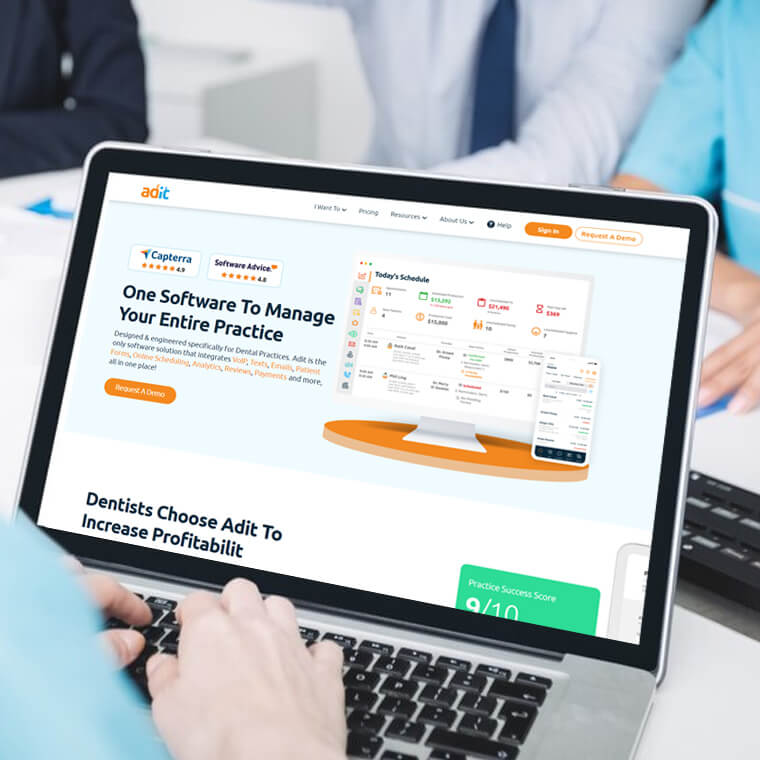
As we navigate the Q1 dental industry landscape in 2024, the dynamic and multifaceted trends shaping the future of dentistry become evident. From cutting-edge technologies to sustainable practices, cultural inclusivity, and continuous education, staying informed is key to thriving in this ever-evolving field.
For a seamless integration of these trends into your practice, consider leveraging advanced dental practice management solutions like Adit dental software. Empower your clinic with streamlined administrative tasks, enhanced patient communication, and optimized workflows. Join the forefront of innovation and excellence in oral healthcare by providing your team with a comprehensive toolbox of cloud-based management tools, including:
- Practice Analytics
- Online Scheduling
- Dental Treatment Planning
- Automated Appointment Reminders & Follow-Ups
- Call Tracking & Recording
- Internal Chat
- Secure 2-Way SMS Patient Messaging
- Patient Forms
- Adit Pay
- Patient Recall
- Telemed
- Adit Voice
- Mobile App
- And more!
Welcome to a future of innovation, growth, and exceptional patient experiences with Adit Dental Software – where the vision for the future of dentistry begins. Book your free demo today.
more about Adit?
Say goodbye to the hassle of using multiple tools. Adit centralizes your calls, texts, payments, reviews, and scheduling into one powerful dashboard. Simplify your operations and boost patient satisfaction today.
Schedule a DemoAngela is a former English teacher turned marketing content specialist. Over the past 10 years, she’s developed marketing strategies to forge enduring bonds between B2B, B2C and SaaS companies and their clients through holistic education, effective communication, and captivating storytelling that moves audiences to act.
Get a $25 Gift Card when you take a demo
Schedule a DemoGet a $50 Gift Card
when you take a demo
Looks like you're out of bounds!
Hey there! Your current location falls outside Adit's area of operation. If this is unexpected, try disabling your VPN and refresh your page. For further assistance or to book a live demo, connect with us at 832-225-8865.
February 18 Amazon Demo Promo
Terms and Conditions
Last Updated: February 18, 2026Offer ends February 21, 2026, and is limited to prospective customers who sign an annual agreement before February 28, 2026. Gift card will be emailed to the company owner or established representative within 4 weeks of signing the annual agreement. Offer may not be combined with any other offers and is limited to one (1) gift card per office. Offer is not available to current customers or to prospective customers or individuals that have participated in a Adit demo during the prior six (6) months. Recipient is responsible for all taxes and fees associated with receipt and/or use of the gift card as well as reporting the receipt of the gift card as required under applicable federal and state laws. Adit is not responsible for and will not replace the gift card if it is lost or damaged, is not used within any applicable timeframe, or is misused by the recipient. Adit is not responsible for any injury or damage to persons or property which may be caused, directly or indirectly, in whole or in part, from the recipient’s participation in the promotion or receipt or use of the gift card. Recipient agrees to indemnify, defend and hold harmless Adit from and against any and all claims, expenses, and liabilities (including reasonable attorney’s fees) arising out of or relating to a recipient’s participation in the promotion and/or recipient’s acceptance, use or misuse of the gift card. This offer is sponsored by Adit Communications, Inc. and is in no way sponsored, endorsed or administered by, or associated with Amazon.
Thank You!
We appreciate your interest! Adit AI will be calling you in the next few minutes!
Why Adit?
Cut your software bill by up to 60% when you merge everything your dental office needs to run under one roof.
Centralize Communications
- Phones & TeleMed
- Emails & eFax
- Texting & Reminders
- Call Tracking and more!
Streamline Operations
- Patient Forms
- Online Scheduling
- Payments
- Reviews and more!
Boost Production
- Performance Dashboards
- Morning Huddle
- Claims & Collections
- Patient Profiles
- Follow Up Lists
- Year Over Year Metrics
Acquire More Patients
- Digital Marketing
- Website Design
- SEO
- Google Ads
- Facebook Ads
when you sign up with Adit!
Sign up by filling out the form



